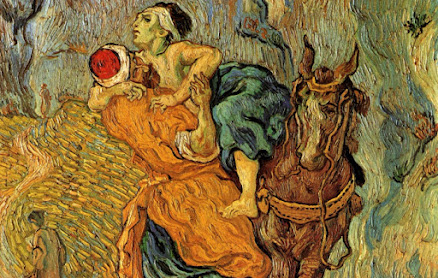But because he wished to justify himself, he said to Jesus,
“And who is my neighbor?”
Do we recognize it when we are trying to justify ourselves? This scholar of the law understood what the law required. Jesus told him that if he could do so it would allow him to inherit eternal life. The scholar, the one who himself provided the answer, must at the same time on some level have realized that he himself could not achieve this. Neither he nor any man could manage to love God with entirety of heart, being, strength, and mind. Neither could his love always embrace his neighbor as much as himself. Perhaps he really did love God and neighbor, even to a great degree. But the degree of love to which he was called was impossible for men. It seemed to require that one actually be God to love like that. Was there a unity between the unlimited nature of God's life and love and the eternity of his being that was just not attainable for this scholar? It was a gap so great that the scholar felt the need to justify himself.
What do we do when we come up against our own limitations? Do we try to justify ourselves, to make ourselves righteous through our own thoughts and actions? We often do what the scholar does. We try to scale back the meaning of demands that seem impossible. We say, 'Well God couldn't have meant something so extreme as that.' We say, "And who is my neighbor?"
Jesus knew that he was asking for something that was impossible according to the Old Law. The priest and the Levite could offer no assistance. They were unable to offer love to the one who was near and who needed them. It took one who came from outside, who was moved with compassion for the victims of sin and death, to truly care for and love his neighbor. He poured the oil of his Spirit and the wine of his joy over man wounded by sin. In his human nature he carried the burden of man all the way to the cross and paid the price for his redemption and his care in the inn, his Church.
For the scholar of the law and for us eternal life was not possible. But for God all things are possible (see Matthew 19:26). And God did what man, wounded by sin could not do.
For God has done what the law, weakened by the flesh, could not do. By sending his own Son in the likeness of sinful flesh and for sin, he condemned sin in the flesh (see Romans 8:3).
Because we need to receive this salvation as a gift from Jesus, Paul is adamant in his insistence that we look to no other gospel. He warns us against the temptation to justify ourselves, telling us instead to receive that righteousness that God gives us in Christ Jesus.
Now I want you to know, brothers and sisters,
that the Gospel preached by me is not of human origin.
For I did not receive it from a human being, nor was I taught it,
but it came through a revelation of Jesus Christ.


No comments:
Post a Comment